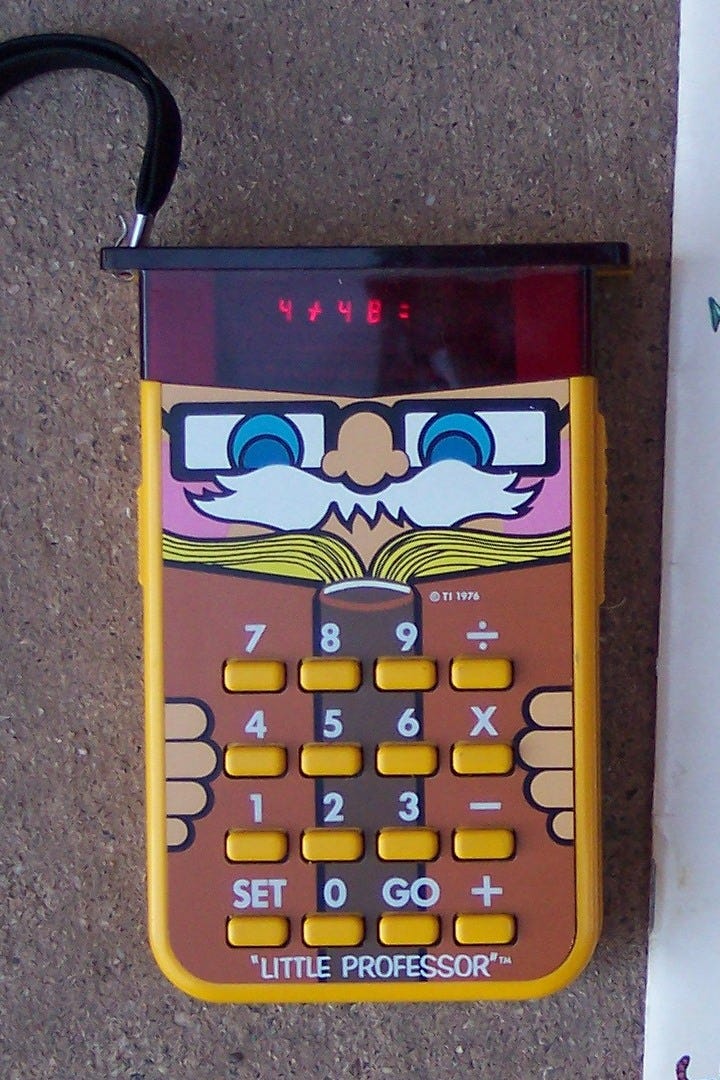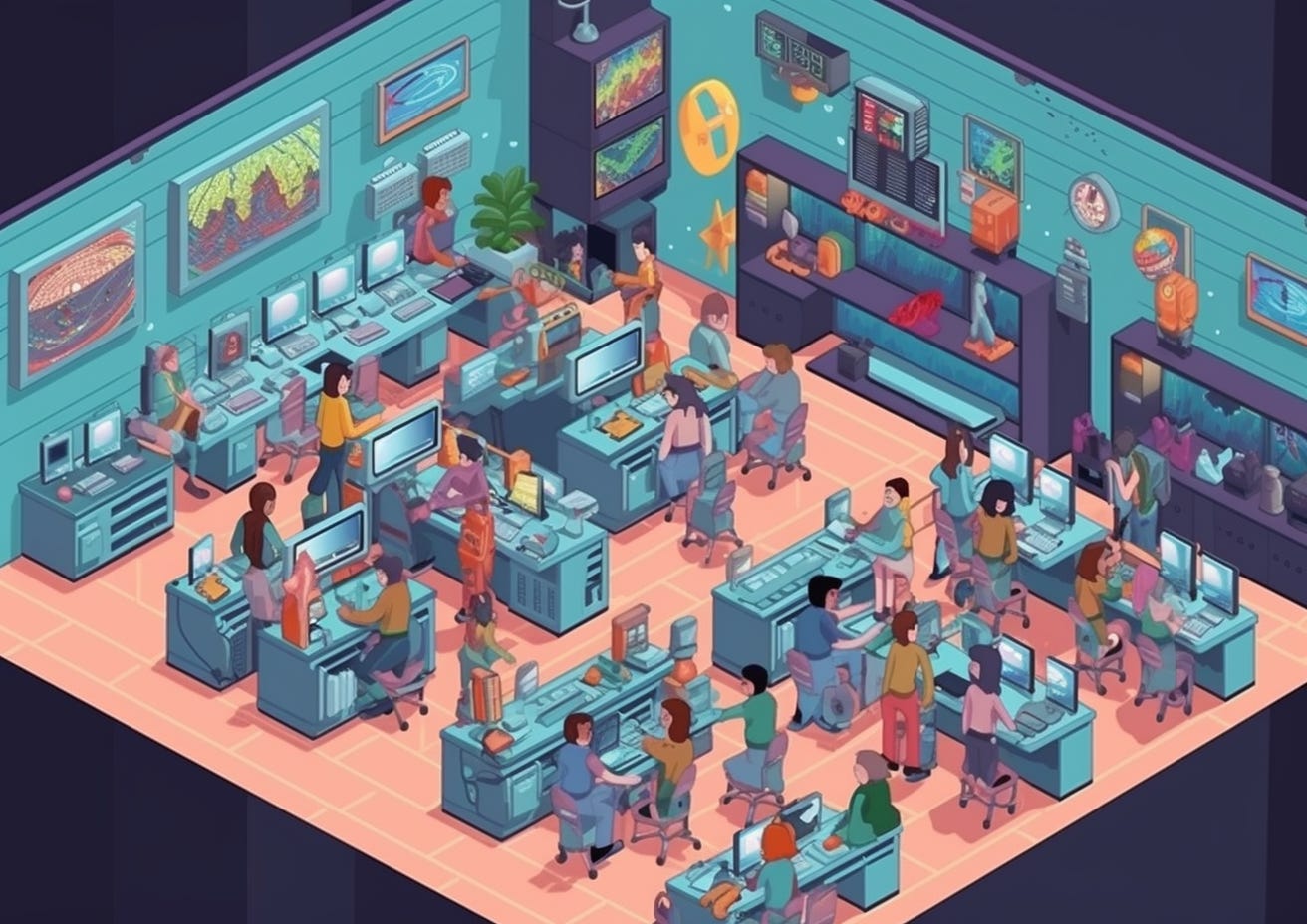The future of education in a world of AI
A positive vision for the transformation to come
The first place that AI panic hit was classrooms. AI’s potential for cheating, and for new forms of teaching, is so immediately obvious that I run into people all the time who believe the whole education system is going to collapse. But I actually think the opposite is true: education will be able to adapt to AI far more effectively than other industries, and in ways that will improve both learning and the experience of instructors.
I want to explain why, but first, I want to give you my underlying assumptions. I try not to make predictions, but I think these are fairly safe bets:
AI cheating will remain undetectable and widespread. There is already considerable evidence to suggest this will be true. My own classroom experiments showed even small amounts of editing defeated AI detection software, detection technology is mostly aimed at earlier models of ChatGPT, and research has shown that, even in theory, it is impossible to build a perfect AI detector. And, of course, students were already cheating a lot, they will keep doing so with AI.
AI technology will remain ubiquitous. Right now, ChatGPT-3.5 is free. Bing is free. Bard is free. All of these models give unprecedented writing and analytical power to everyone. Even if technology did not develop further (and it will), I assume its use will become widespread and costs will remain reasonable.
AI tutoring will be excellent, but not a replacement for classrooms. This might be my most controversial point, with some readers arguing that AI tutors aren't particularly effective, while others claim they'll replace teachers universally. I'll explore this in more detail in future posts, but for now, let me offer two quick points: first, having experimented with AI-driven teaching, I can say it demonstrates incredible potential for adaptive, useful instruction - it's genuinely impressive! However, tutoring alone isn't enough; classrooms provide so much more, from opportunities to practice learned skills, collaborate on problem-solving, socialize, and receive support from instructors. School will continue to add value, even with excellent AI tutors.
In short, we are already in a world where many students use AI to help them with with school work, but that help goes beyond just cheating (though that happens, too), to include students using AI as a tutor and guide for learning. How will these trends change education? We can start with a history lesson about the last time a technology made cheating easy and challenged a centuries-old approach to teaching a major subject...
Enter the calculator
When the calculator was first introduced in schools the reaction was surprisingly close to initial concerns I hear about students using AI for tasks like writing today. As discussed in this history by Sarah Banks, in the early days of their popularity in the mid-1970s, many teachers were eager to incorporate calculators into their classrooms, recognizing the potential for increased student motivation and engagement. They believed that students should learn the basics before using calculators to tackle more realistic and complex problems. However, not everyone shared this enthusiasm. Some teachers were hesitant to adopt calculators, as their effects had not been thoroughly researched, and they believed that curriculum should be adapted before introducing new technology. A mid-1970s survey found that 72% of teachers and laymen did not approve of 7th-grade students using calculators. One concern was the inability to help students understand and identify their errors, as the calculators did not log the buttons that students pressed, making it difficult for teachers to see and correct mistakes. Early research similarly found that parents were worried that their children would become dependent on the technology and forget basic mathematical skills. (Which all sounds very familiar)
Attitudes shifted quickly, and by the late 1970s parents and teachers both became more enthusiastic by However, they also saw the potential benefits of calculator use, such as improved attitudes toward learning and ensuring their children were well-equipped for a technology-driven world. A year or two later, another study revealed that 84% of teachers wanted to use calculators in their classrooms, but only 3% were employed by schools that provided calculators. Teachers were generally untrained in their use and needed support from administration and parents to incorporate them into their classrooms. Despite the lack of official policies, many teachers continued to use calculators. The debate persisted into the 1980s and early 1990s, with some teachers still believing that calculators hindered students' acquisition of basic skills while others considered them essential tools for the future. By the mid-1990s, calculators were part of the curriculum, and used to compliment other ways of learning math. Some tests allowed them, some did not. A practical consensus was achieved. Math education did not fall apart.
To some extent, AI will follow a similar path. There will be assignments where AI assistance is required, and some where AI use is not allowed. In-school writing assignments on non-internet enabled computers, combined with written exams, will ensure students learn basic writing skills. We'll find a practical consensus that will allow AI to be integrated into the learning process without compromising the development of critical skills. Just as calculators did not replace the need for learning math, AI will not replace the need for learning to write and think critically. It may take awhile to sort it out, but we will do so.
A more fundamental transformation
But the impact of AI goes beyond just writing. I believe it's inevitable that AI will transform classrooms. It obviously takes on some of the role of instructors, acting as a fantastic tutor and explainer of concepts (as one student told me, "Why raise your hand in class when you can ask ChatGPT a question?"). But by doing this, AI also has the potential to benefit teachers, students, and education as a whole. To understand why, it's important to see why traditional teaching methods, like lectures, aren't that effective, and why their alternatives haven't taken off as quickly as some educators would like.
Lectures tend to rely on passive learning, where students simply listen and take notes without engaging in active problem-solving or critical thinking. In this format, students may struggle to retain information, as their attention can easily wane during lengthy presentations. Moreover, the one-size-fits-all approach of lectures doesn't account for individual differences and abilities, leading to some students falling behind while others become disengaged due to lack of challenge. A contrasting philosophy, active learning, eliminates the lecture, asking students to participate in the learning process through activities like problem-solving, group work, and hands-on exercises. In this approach, students collaborate with each other and the instructor to apply what they've learned. Multiple studies support the growing consensus that active learning is one of the most effective approaches to education, but it can take effort to develop active learning strategies, and students still need proper initial instruction. So how can active learning and passive learning coexist?
One solution to incorporating more active learning is by "flipping" classrooms. This teaching method flips the traditional model of instruction by having students learn new concepts at home, typically through videos or other digital resources, and then apply what they've learned in the classroom through collaborative activities, discussions, or problem-solving exercises. The main idea behind flipped classrooms is to maximize classroom time for active learning and critical thinking, while using at-home learning for content delivery. The value of flipped classrooms seems to be mixed, ultimately depending on whether they encourage active learning or not.
So, the problem with implementing active learning lies in the lack of quality resources, from teacher time to the difficulty of finding good "flipped" learning materials, thus maintaining a status quo where active learning remains rare. This is where AI comes in. Although there will be downsides (lecturing and standard assignments will become untenable, requiring substantial revision), AI can also make the lives of teachers easier as well, hopefully lowering the burden. But AI allows for more fundamental changes as well.
Imagine introducing high-quality AI tutors into the flipped classroom model. These AI-powered systems have the potential to significantly enhance the learning experience for students and make flipped classrooms even more effective. They provide personalized learning, where AI tutors can tailor instruction to each student's unique needs while continually adjusting content based on performance. This means that students can engage with the content at home more effectively, ensuring they come to class better prepared and ready to dive into hands-on activities or discussions.
With AI tutors taking care of some of the content delivery outside of class, teachers can devote more time to fostering meaningful interactions with their students during class. They can also use insights from the AI tutors to identify areas where students might need extra support or guidance, enabling them to provide more personalized and effective instruction. And with AI assistance, they can design better active learning opportunities in class to make sure learnings stick.
This isn't a far-future pipe dream. Tools from Khan Academy (and some of our own experiments) suggest that GPT-4, when properly prepared, is already an excellent tutor. Students are already using AI as a learning tool. Teachers are already using AI to prep for class. The change is already here, and we will all encounter it sooner or later. It may force us to change models, but it will be in a way that ultimately enhances learning and reduces busywork.
A time of uncertainty
While it's impossible to foresee the exact impact AI will have on everything from curricula to the nature of work, one thing is clear: these changes will infiltrate classrooms in ways that are difficult to predict, and this may challenge the vision I've outlined above. We are undeniably in an era of transformation, but I'm confident that the issues arising from AI integration in education can be addressed, with benefits for students, teachers, parents, and society. Throughout history, educators have demonstrated their ability to adapt to technological advancements and societal shifts. Change is coming to classrooms, and I think it is important to focus on a positive vision to help guide as through the uncertain times ahead.




Excellent summary, as one would expect! I do wonder what the implications of this are for learning infrastructure – from the design of classrooms to the simple question of do students have the space to study properly at home, if we’re relying more on them doing this – and can we create social spaces for those whose home environments don’t allow for deep engagement with learning?
Re the analogy with the introduction of calculators:
"A practical consensus was achieved. Math education did not fall apart."
Did it not? First of all, mathematics (abstract concepts, definitions, theorems, proofs) is not the same as arithmetic. Calculators (for the most part, ignoring things like Wolfram Alpha) do arithmetic. The relevant metric is "numeracy": numerical skill.
I haven't been able to find any definitive research comparing numeracy in the 1960's say to numeracy in the 21st century (and I'm not sure how what that research would look like) but at least anecdotally, it seems that numeracy today is of great concern in many countries. Is that partly due to the early and widespread use of calculators? Once again, subjectively (I teach math), I'm inclined to guess the answer is yes (although my sample size is relatively small, and highly self selected).
50 years from now, will teachers of literature and essay writing, poetry and written communications (like journalism), have similar anecdotal reactions to the current level of literacy post AI? Will we have students who can't write basic prose (without AI help) alongside the ones who can't do basic arithmetic (without a calculator)? I suspect/fear the answer is yes.